When we hear the word cancer, it is very common to think of a terrible disease that is difficult to fight. However, since there are many forms of manifestation and many types of cancer, it is practically impossible to talk about it in a generic way. That is why today we are going to talk specifically about mouth cancer. If you want to know what the symptoms are, how it is diagnosed, what types of treatments exist, and a variety of other information about the disease, read this text to the end and check it out!
What is Mouth Cancer?
Mouth cancer is characterized by the abnormal growth of cells in a certain region of the mouth. It can therefore appear in different areas, such as the tongue, gums, lips, roof of the mouth, or other regions. This disease is much more common in men than in women, especially those over the age of 40. Even so, the disease can affect anyone, although it is quite rare in children and young people. 
Symptoms of Mouth Cancer
The first thing to pay attention to when we talk about any type of cancer are the symptoms it presents, since these are the signs that can make us realize something is wrong and seek a specialist for a diagnosis. Some of the main symptoms of mouth cancer are:
- Sore in the mouth that does not heal
- Constant pain in the mouth
- Persistent bad breath
- Weight loss
- Difficulty speaking
- Numbness of the tongue
- Swelling in the jaw
- Difficulty chewing or swallowing
- Presence of lumps in the neck or mouth area
Even if you are not part of the at-risk group, it is important to see a doctor if you feel one or more of these symptoms, as they may indicate the beginning of the disease or even another issue.
Risk Factors
As we mentioned earlier, mouth cancer is much more common in males and in people over 40. Still, there are other factors that contribute to the development of the disease. These include:
- Smoking
- Poor eating habits
- Poor oral hygiene
- Excessive sun exposure to the lips
- Family history of the disease
If someone in this group shows any symptoms, it is very important to seek an otolaryngologist as soon as possible so the disease can be diagnosed and, if necessary, treatment and cure can begin, thus avoiding worse consequences. There is no consensus on how to prevent the disease, since it can arise from genetic factors and be practically unavoidable in some cases. However, avoiding certain habits such as excessive alcohol use, smoking, and poor diet can help a lot in this regard.
How is the Diagnosis Made?
When a person seeks medical care, the first thing the doctor will do is assess all symptoms and relate them to the risk factors listed above. If they suspect it may indeed be mouth cancer, the patient may undergo various tests such as X-ray, CT scan, among others. It is recommended to perform a self-exam before visiting a doctor, checking for any unusual sore in the mouth that tends not to heal or even for lesions or lumps that may signal some kind of problem. It is worth noting that, as with any other type of cancer, the earlier the diagnosis is made, the higher the chances of curing the disease and the smaller the possible aftereffects that treatment may leave.
Treatment of Mouth Cancer
First of all, it is worth emphasizing that about 80% of mouth cancer cases are cured, which is considered a high number. The treatment of mouth cancer can vary greatly depending on the stage of the disease. It is usually done through surgery aimed at removing the area containing the cancerous cells or through radiotherapy. Depending on the case, both types of treatment may be combined to achieve a better result.
Consequences of Mouth Cancer
Like any other type of cancer, mouth cancer can leave aftereffects and consequences, mainly because the treatment is quite invasive. It is possible, for example, that a person may lose their teeth due to weakened gums, or even lose parts of the mouth because of surgery. Although these consequences are not favorable from an aesthetic perspective, there are already various procedures that help restore these lost parts. When the disease is not treated or the treatment is not done properly, a person may even die. Although this is a subject we hope never affects our lives, cancer often develops. And it is extremely important to know all the information about the disease to understand whether or not you are part of the risk group and also to know what the main symptoms are. Furthermore, having all this information is also important when you consult a doctor. That way, treatment is carried out more smoothly, with you understanding what the risks and benefits of each are, in addition to giving you peace of mind.











